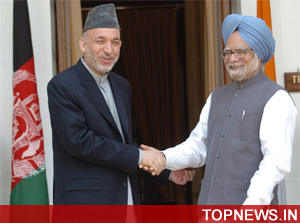Afghanistan, India to share intelligence on fight against terrorism
 Kabul - Afghan and Indian foreign ministers vowed on Thursday to cooperate in the fight against terrorism in the region and said they had discussed ways of sharing intelligence and acting on it.
Kabul - Afghan and Indian foreign ministers vowed on Thursday to cooperate in the fight against terrorism in the region and said they had discussed ways of sharing intelligence and acting on it.
Indian External Affairs Minister Pranab Mukherjee told a news conference in Kabul that he and his Afghan counterpart, Rangeen Dadfar Spanta, and other Afghan officials had looked at ways "to strengthen our intelligence mechanism and to share information and intelligence and to act on it."
Mukherjee, who arrived in Afghanistan on Wednesday for a two-day visit, said the fight against terrorism was not confined to one country. All countries had an international obligation to "control terrorist activities emanating from the sanctuaries and camps located within their territory," he said.
His comment on terrorist camps was an apparent reference to Pakistan's tribal areas, where Afghan and NATO officials say Taliban militants have safe havens.
Spanta, also speaking at the news conference, called India a "strategic partner".
Early on Thursday Spanta accompanied Mukherjee and Afghan President Hamid Karzai to western Afghanistan for the hand-over of a crucial new highway built with Indian funding of 150 million dollars.
The 218-kilometre highway, which serves as a symbol of India's developmental work in the war-wracked country, links western Afghanistan to the Iranian border and eventually to ocean. The new rout is expected to reduce land-locked Afghanistan's dependency on Karachi port in neighbouring Pakistan.
The close relations between Kabul and New Delhi have raised concerns among Pakistani officials, who see India as an old rival. Pakistan and India, two nuclear-armed neighbours, have fought three wars since gaining independence from British rule in 1947.
Following a terrorist attack in Mumbai that left more than 170 dead in November last year, New Delhi alleged that the Pakistani- based Islamic group Lashkar-e-Taiba was behind the attack.
The allegation revived the tension between the two South Asian states, and nearly brought them to the brink of war. India and Pakistan had started bilateral talks to improve their relations in 2004.
Afghan government officials say that the recent efforts by Karzai has been vital in reducing the tension between India and Pakistan. Karzai has established good relations with his Pakistani counterpart Asif Ali Zardari and Indian Prime Minister Manmohan Singh.
Karzai visited New Delhi last week, where he and Singh also vowed to fight terrorism in the region. Karzai is also expected to visit Islamabad in the near future, according to a presidential spokesman.
India is one of the biggest donors for the post-Taliban Afghanistan. It has pledged 1,250 million dollars since 2001 and provides scholarships for 1,000 students to study in Indian universities annually. (dpa)